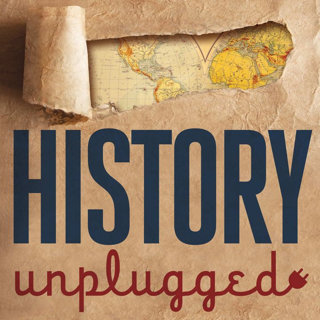
The Mongols Killed So Many People They Lowered the Global Temperature
Welcome to part one of Mongol Week(s). In this multi-part series, we will look at the Mongolian Empire from multiple perspectives, including its unprecedented level of brutality (so many died from their attacks that untended farmland returned to forrest, scrubbing the atmosphere of carbon and causing global cooling).But we will also look at their positive contributions -- the opening up of the Silk Road, religious tolerance, and rights granted to women. We will also consider the rise of Temujin (Genghis), the importance of the Mongolian horse and bow, battle tactics, and everyday life.See omnystudio.com/listener for privacy information.
30 Jan 201812min

Chester A. Arthur's Presidency Was a Colossal Accident...And a Huge Success
Chester A. Arthur, America's 21st president, lands on the lists of the most obscure chief executives. Few know anything about him besides his trademark mutton-chop sideburns. Moreover, he fell into the position unexpectedly when Garfield was assassinated; the political pros though he would be a failure as president. Maybe Arthur did also. After all, he was a flunkey in the New York political machine who spent his nights eating, drinking, and smoking cigars with the other good ole' boys and frequently didn't show up at work in the New York Customs House until 1pm. He only got on the Vice Presidential ticket of Garfield because Republicans were desperate to get support from New York and needed a native son on the ticket. But Arthur shocked everyone by doing well as president. He went up against the very forces that had controlled him for decades. He implemented new rules requiring the federal government to hire workers based on their qualifications, not their political connections. He supported a civil rights act to bar racial discrimination, even though the public overwhelmingly supported it.See omnystudio.com/listener for privacy information.
29 Jan 201851min

The Vietnam War Was About...Stealing Asia's Tin?
Fighting over scarce resources have fueled wars back to the Sumerian city-states squabbling over water-use rights of the Euphrates river. Did the same drive fuel America's entrance into Vietnam to take its tin? Listener Toby asks if there's any truth to the the conspiracy theory that only reason the Vietnam war was waged was for a scarce metal, not to fight the communist threat like most of us has been taught. See omnystudio.com/listener for privacy information.
26 Jan 20188min

About 70-90 Percent of a Society Needs to Die Before It Completely Collapses
Some disasters hurt society (Hurricane Katrina in 2005). Bigger ones permanently alter it (the Black Death in the 1300s; Mao's Great Leap Forward). The worst of disasters completely destroy a civilization and leave behind so few they take centuries to recover (the Mongolian slaughter of Iran in the 1200s; the smallpox epidemic among Native Americans). Today we look at the tipping points between a society being hurt and a society being mortally wounded.See omnystudio.com/listener for privacy information.
25 Jan 201812min

Why The Black Plague is Partially (But Not Completely) Responsible For the Renaissance?
The death of thirty percent of Europe's population in the fourteenth century permanently altered the medieval social order, and many scholars credit the Black Plague with ushering in the Renaissance. But this is not the whole story—after all, plagues have ravaged the ancient world throughout human history without a similar cultural flowering to show for it. We look at other factors that ran parallel to the plague to transform Europe's culture.See omnystudio.com/listener for privacy information.
24 Jan 20188min

Did Mussollini Really Make the Trains Run on Time?
Fascism is loved by few, but many at least credit Mussolini's heavy-handed rule for making Italy's notoriously disastrous train system operate effectively. Was this actually true or more of Il Duce's propaganda?See omnystudio.com/listener for privacy information.
23 Jan 20186min

How Teddy Roosevelt Became The Man He Was in the Badlands—William Hazelgrove of “Forging a President”
Teddy Roosevelt wasn’t born as the rough riding, big-game-hunting, Amazon-exploring legend that America has come to love. So how did he become the larger-than- life character portrayed in history books? He was forged by the last vestige of the Wild West—the Badlands of the Dakota Territory. Yet this side of one of America’s most popular presidents has mostly gone unexploredIn this episode I talked with William Hazelgrove, author of the book Forging a President: How the Wild West Created Teddy Roosevelt. Roosevelt once stated, “I have always said I would not have been president had it not been for my experience in North Dakota.”Faced with tremendous heartbreak and extreme adversity, Roosevelt headed West for comfort and healing. Little did he know that the ways of trappers and thieves would create his bombastic personality, and later lead him to run for president of the United States.See omnystudio.com/listener for privacy information.
22 Jan 201842min

The Origin of the High Five
The origins of some cultural practices are lost to the mists of time. Not so the high five. We can trace it back to a specific day at a specific baseball game. From then on the world was never the same.See omnystudio.com/listener for privacy information.
18 Jan 20185min






















